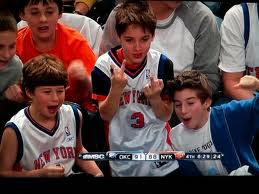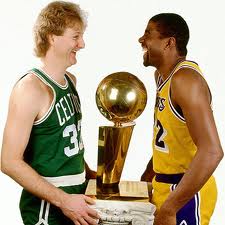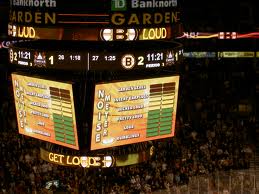
These fans are sitting in what used to be press row at Madison Square Garden
David Stern never really cared about the people who did more to publicize his product than any other group: the NBA beat writers for the daily newspapers, and later, for the major Web sites.
Stern pretended to evince a modicum of interest in his meetings with us, which came a couple times during the year. He’d listen, then basically ignore everything he heard. Our plight, whether it was floor seating, access to practice or player availability, never seemed to coalesce with the overall mission in his supposedly visionary mind.
That did, and still does, seem wholly inconsistent with someone who supposedly loved the game. Why wouldn’t he go out of his way to support the very people who, for the first half of his 30-year tenure, were the only day-to-day source of NBA information? He didn’t. I never understood that.
Had it not been for Brian McIntyre, the NBA’s estimable public relations czar, reporters would have had it even harder. Stern didn’t care if we saw the game from the upper reaches of an arena, even though basketball was a game that really needed to be watched and covered from the floor.
The owners wanted those seats to sell? Fine with the commish. Never mind that in places like Boston, the seats that the reporters used to occupy are now occupied by ownership and their friends. See the above photo for the quality of the clientele that reveled in seeing themselves on TV from what used to be press row at Madison Square Garden.
I, for one, do not share Danny Schayes’ opinion that Stern had a love for the game. He had a love for the almighty dollar, which trumped any love for the game.
 Does anyone who has been around the NBA for David Stern’s three-decade tenure honestly believe that the quality of play today is better than it was in the early 1980s? Trust me, it isn’t.
Does anyone who has been around the NBA for David Stern’s three-decade tenure honestly believe that the quality of play today is better than it was in the early 1980s? Trust me, it isn’t.
Back in the 1980s, you need a handful of Hall of Famers to even compete for a title.
Today, two or three usually does the trick.
Stern pushed through expansion, adding seven teams. That’s roughly 105 players now in the league who would not have been in the league he inherited. Another byproduct of expansion, however, was even more appalling (or appealing, if you’re Stern): the total sellout of the game to the marketing people.
The NBA today is not about basketball. The basketball-to-marketing Rubicon was crossed in the late 1980s, when the NBA decided to expand to Hooterville – Orlando and Charlotte.
Prior to expansion, we could watch a game without getting bombarded by mascots and stentorian public address announcers. Orlando and Charlotte changed all that and, unfortunately, the rest of the NBA has followed suit.
 Today, the most important part of an NBA game is not the game itself. It’s the “game experience.” It’s the dance teams. It’s the Jumbotron. It’s the giveaways during timeouts. It’s Ozzy Osbourne. My friend Kevin Paul Dupont of the Boston Globe has a good phrase for all this: Audio Porn. It is.
Today, the most important part of an NBA game is not the game itself. It’s the “game experience.” It’s the dance teams. It’s the Jumbotron. It’s the giveaways during timeouts. It’s Ozzy Osbourne. My friend Kevin Paul Dupont of the Boston Globe has a good phrase for all this: Audio Porn. It is.
Stern can remember what it was like to sit in an arena where the noise came from the fans actually, you know, watching the game! But he didn’t care that his arenas turned into mini theme parks. He endorsed it. He didn’t care that the product on the floor was such that it needed bells and whistles to make the evening satisfactory. T-shirt guns now bring the loudest cheers. Think about that for a moment.
That is not to say going to a game in the 1980s was always an out-of-body experience. But you went to a game back then knowing what you were going to get. You went to see basketball, not yourself on the Jumbotron.
But all this translates to money.
Stern has made the owners fabulously rich (OK, most were rich before they bought in) which is his No. 1 job description. But I can’t tell how you how many people I know who say they just aren’t interested in today’s NBA. That, too, is on Stern.
 He absolutely blew the whole rookie draft. Why should any unproven player walk into a job with guaranteed money? What other vocation does that? Getting guaranteed money guarantees a player will leave college early. Who wouldn’t do that?
He absolutely blew the whole rookie draft. Why should any unproven player walk into a job with guaranteed money? What other vocation does that? Getting guaranteed money guarantees a player will leave college early. Who wouldn’t do that?
Some of the draftees deserve the money and those that do will get theirs. But so many of those first-rounders flame out while still pocketing millions. It’s ridiculous. Stern can moan about the one-and-dones, but how does he not see that guaranteeing money to unproven players hastens the decision to leave college?
This may all come across as the rantings of a crank. Fine.
But it’s also a grasp at nostalgia, to a time when the squeak of sneakers – not manufactured noise – was what you heard at an NBA game. To a time when writers and broadcasters, the very individuals whose lives intertwined with the game, were front and center to describe the sights, sounds and even the smells of the game.
I know those days aren’t coming back.
And I’m sure David Stern sleeps very soundly at night knowing that.
The NBA is exponentially better off financially now than when he took over. That’s indisputable.
But the caliber of play? No way.
The overall talent of the league? No way.
That, too, sadly, is indisputable.
Peter May is the only writer who covered the final NBA games played by Larry Bird, Magic Johnson and Michael Jordan. He has covered the league for three decades for The Hartford Courant and The Boston Globe and has written three books on the Boston Celtics. His work also appears in The New York Times. You can follow him on Twitter.
Using increased 3 point % now as a prove of increased talent compared with the 80´s is a blatant misrepresentation and a prove that you have no idea of what you are talking about.
The NBA started using the 3 point line in 1980, therefore players before that had no motivation to have 20 plus range. Is the same reason why 80´s players had an intermediate game that now has vanished.The only reason for increased % now is that kids grow in a game with a 3 point line. Players now spend their formative years shooting threes instead of spending their time like james whorty or kevin McHale practicing post moves.
Back in the day teams drafted the best player available, now they draft “talent” (a fancy way to say athletic ability) on the premise that size and genetics can not be learned, but basketball abilities can. The problem is that almost never a player develops to 20% of his “potential”. Giving millions to a teenager has proven to stop motivation to learn post moves or basketball I.Q. Now players do not improve until their “talent” fades, like Amare Studamire, who was in the league 10 years and had 4 knee operations before he bothered to learn to post up.
The obvious result is that players now (besides a few superstars) suck when compared to the 80´s. And that is a fact.You only have to see those knuckleheads fouling three point shooters to know they are freaking clueless about basic game theory.
What this article lacks is a mention of the overpromotion of dunks and flashy plays that Stern did in the late 80´s and 90´s. Stern was dealt a poker when Bird and Magic saved the league with almost perfect team basketball but it became a royal flush for him when jordan took the torch from them. He was as good, but even more important to Stern, he was flashy, so the nba was marketed on dunks, amazing drives and more dunks. We got sold jumping crap like Vince as the new Jordan over and over, while at the same time GMs pressed their bets by drafting more and more dunking freshmans and high schoolers until the pool was almost dry of developed players. Now we are being sold kids like Wiggings or Exum like they are the new Jordan when they can barely run a pick and roll.
Meanwhile, guys like David West are extint while the league has to play 3´s as “strech fours”. Who are they kidding?
The reality is that Stern (and a legion of incompetent GM´s) has diluted so much the basketball I.Q. of the league, that if you factor out “jumping/talent” (and the “no holding” rules on D) there is no doubt that the NBA now is a pale shadow of 80´s NBA.
If the future of the NBA are teams like the Rockets, that new Silver guy should be preparing a new change in rules, like banning the corner 3 or taking back the line to 30 feet, because a league where Brandon Jennings is a starter is a league not really worth watching.
this was supposed to be a reply to Hugo Menendez comment , and not a comment on the article (I agree with the premise) per se..
my bad…
I’ll respond to several claims in this article.
1:
“The NBA is exponentially better off financially now than when he took over. That’s indisputable.
But the caliber of play? No way.
The overall talent of the league? No way.
That, too, sadly, is indisputable.”
Making blanket statements like these without any backing is just cheap, bad writing. Here are a couple of counterpoints to your claims:
Caliber of play: A good way to measure this is by shooting percentages. In Stern’s first full season as commissioner, players shot .499 on 2s and .282 on 3s. This season they are shooting .451 on 2s and .358 on 3s. So they got a lot worse on 2s and a lot better on 3s. If you look at effective FG%, which factors in both 2s and 3s, the league was then, and is now shooting .496. So this looks like a push, though one could easily argue it as a sign of increased caliber of play, since while the same amount of points are being scored per shot attempted, a higher percentage of these points are being scored on more difficult shots that require a lot more practice to become proficient at. Also of note that the 3pt line is now a good deal further away from the hoop than it was back then which, factored in to what I just said, pretty well shows that players are better at getting the ball into the hoop when factoring in degree of difficulty of their shots.
“Overall talent level”: When you say the level of talent is lower, I wonder if you just meant to be repetitive and again say that the caliber or quality of play is lower. Because if you actually meant the talent level is lower, well… I think that can be argued against quite easily.
Talent isn’t skill. It isn’t being good at something because you’ve practiced it a lot and steadily become better at it in spite of your lack of natural abilities. Talent is your innate ability to do something well if you apply yourself to it. Saying that the “overall talent level” of the league is now lower than thirty years ago would seem to mean you think one (or more) of the following:
A. That the basketball talent level in the 80s was some kind of genetic, generation fluke that hasn’t been replicated in this generation, or that this generation is just flukishly untalented.
B. That those with supreme basketball talent are now spurning basketball to do other things. Seems unlikely with how popular basketball is now with young people and with the widespread knowledge of how much money you can make at it you are talented.
C. That the pool of foreign basketball players (numbering in the hundreds of millions) that wasn’t contributing to the talent level of the NBA in the 80s is also not contributing to the talent level of the NBA today, despite the many dozens of international players currently in the league.
D. That the 7 teams that joined the league during Stern’s tenure, while adding about a hundred roster spots to the league, chose to only sign players with little or no talent, as adding players with substantial or great talent certainly add to the “overall talent level” of the league. (Unless of course all the older teams suddenly decided to start drafting and signing less talented players whenever they saw the league expand, which doesn’t make a lot of sense.)
2:
“He absolutely blew the whole rookie draft. Why should any unproven player walk into a job with guaranteed money? What other vocation does that? Getting guaranteed money guarantees a player will leave college early. Who wouldn’t do that?”
Again, there are several problems with what you’re saying here. First, players don’t get guaranteed money *before* they leave college early. There isn’t a list put out by Stern or the owners or GMs saying which players will get guaranteed money. They only get the guaranteed money after choosing to leave school early and then possibly getting drafted in the first round.
But maybe your weren’t being so literal about it and you just meant that no player who was likely to be drafted in the first round, based on mock drafts and such, and get guaranteed money would choose to go back to school. But that is just categorically false, as demonstrated by many individual examples. Most recently, Marcus Smart was widely regarded as a top pick in the 2013 draft, with many people predicting he’d be drafted #2 overall by the Orlando Magic. He would almost certainly have signed a contract guaranteeing him several million dollars. Your statement about players leaving because the existence of partially guaranteed rookie contracts is just false.
I wonder what you would prefer to the current scale system for rookies. Did you prefer the days when each draft pick negotiated whatever contract he could with the team that drafted him? Did you like it when Danny Ferry got drafted #2 overall but wouldn’t sign a deal with the Clippers, went to Italy, had his rights traded, then came back and signed a 10 year, $40 million dollar guaranteed contract? If this year’s #2 pick turned out to be a bust like Ferry, his team could refuse his option years and end up paying him less than $10 million dollars. The rookie scale system, which I believe Stern was a big proponent of, actually lessens the likelihood of bad players getting paid immense amounts despite not being able to perform once they get to the league. You also neglect the fact that rookie contracts are widely known to be the best value contracts in the league. LeBron James made around $6 million a year for each of his first four years, which if there was a free market for his services someone would have probably paid him $50 million a year, at least after his rookie season.
Maybe you just felt like ranting against guaranteed contracts because when we see a terrible or lazy player on one we get annoyed and wish that money could go to someone who deserves it. But why target partially guaranteed rookie contracts when veteran contracts tend to be so much more egregious? What is more unpleasant: the $15 million Tyrus Thomas made during his 4 year, rookie scale contract, or the $40 million he got on his following, 5 year deal? (Hint: though they’re both atrocious, at least he played out the much smaller deal. He got amnestied 3 years into the much larger, 5 year deal, and is still getting paid.)
Another really important point you didn’t bother to mention is that Stern recently oversaw the *reduction* of guarantees to first round draft picks. From the 1998 draft, when the 4 year scale was introduced, until 2005 CBA revision, the first 3 years of first round picks’ contracts were fully guaranteed, with a team option on the fourth year. When the CBA was revised that year, the third year was made a team option, too. Stern oversaw a *reduction* of guaranteed years to rookies.
3. This is starting to tire me out so I’ll touch on just one more topic. You complain about the reduction in access provided to journalists, yet you don’t once mention the resultant fact: basketball journalism is worse now than it was back when Stern started.
This fact never would have occurred to me. I wasn’t reading the paper back in the early eighties, but I’ve assumed that there were dozens, if not hundreds, of times more articles being written about the NBA today than there were back then. And of course I’d have to read through all the old articles to say so definitively, but based on all the articles I read now I can’t help but think there is as much being reported about teams and players today as there was back then, if not a great deal amount more.
What this all means is that basketball journalism is *not* worse now than it was when Stern took office. But that leads one to wonder why you would complain about worse seats at games and being allowed less time to hang out with players. Unless you come out and say that your journalistic output is worse now than it was back then (using David Stern’s policies as your excuse) then it becomes a matter you still being able to do your job well but being extremely annoyed at having amenities that many fans who could would pay great sums for, things like excellent seats and regular opportunities to hang around players. Which is understandable: no one wants luxuries that have been handed to him to be taken away. But to portray such a scenario as an oppressive dictator stymieing quality reporting of goings on in the basketball world is just pathetic.
4. You wrote:
“Back in the 1980s, you need a handful of Hall of Famers to even compete for a title.
Today, two or three usually does the trick.”
So you want all the great players concentrated on just two or three teams? (Or maybe just one or two, since you probably think there are fewer Hall of Famers playing now, what with the league being less talented.)
Why the interest in not letting fans have teams with good players in their cities? I guess this goes with your desire to keep certain cities from having teams at all, but it just seems mean spirited. Why wish so strongly to keep millions of people from going to (or watching on local tv) games featuring great players?
I’ll end it there with a lot left unsaid. I hope your next article turns out better.
To compare fg% from the 80s and 90s to today’s game is foolish. It is easier to drive to the paint today because of the lack of big men and the 3 second violation that caused this to happen. Also, hand checking is not allowed. That makes it easier to make space and shoot a more open shot. Let’s not even go into the amount of ticky tack fouls that are called, which turn misses into FT% and help maintain a better FG%.
The league wants a softer and less physical league where there a more “superstars” putting up great stats and monster dunks because these things sell to more casual fans who aren’t educated about basketball. Look how much traveling happens, and how calls are now made more selectively than ever. You have these stupid points of emphasis which they stupidly announce and players take advantage of. I’ve seen more 4 point plays this year than I saw the whole 90s era. Players now flop and act like they were hit cause of this stupid emphasis on letting players land.
The NBA is making just about everything into a foul. They don’t want tough nosed defensive teams with low scoring games because that does not sell to casual fans who watch one end out the game. They don’t appreciate a good defensive possesion. The more scoring the better, it doesn’t matter of the guy traveled, or broke a rule. I made it to sports center right?
What about the flopping epidemic? Look at how many times LeBron has flopped this year alone and they haven’t sent a warning his way. He should be up to his 5th offense by now. But he’s “The King”.
In terms of basketball, today’s NBA product is not as good. You just have a bunch of Jordan, magic, bird wannabes who have it much easier and don’t have the skill level, but thanks to the rule changes/selective officiating fill up stat sheets.
So yes I agree with this article, the NBA is mainly about selling a product more than the sport itself. The rule changes, policy changes all point to this.
Good lord, Menendez, your post was long, but I’d have to spend the next 48 hours straight typing how absurd your post actually is. Preposterous. Problem is I don’t think Sheridan has enough bandwidth for the proper response. I won’t say your argument is incredibly idiotic, that would be too mean, so I’ll limit it to a much more friendly “foolish and blind.”
No, I changed my mind. It is incredibly idiotic.
Wow AJ… That is pretty idiotic yourself. You attack someone else’s article without stating why, you have no other backup other than “that’s stupid” is completely dumb. If you have to contradict someone, say why.
As I said six months ago, not enough bandwith. Also, I’ve had four carpal tunnel surgeries. He started off weak with his absurd off-the-wall shooting percentage argument, and it tailed off from there.
I mean bandwidth.